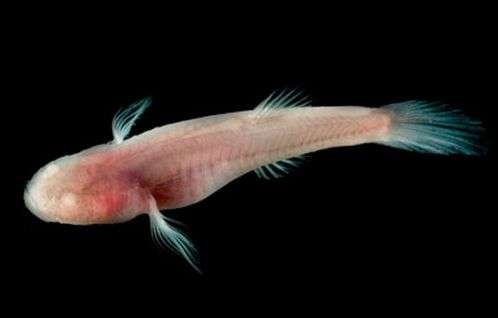March 28, 2013 report
Study finds first example of auditory regression in a subterranean organism

(Phys.org) —A team of researchers made up of members from the U.S. and Canada has found that two species of fish that live in caves in the eastern and central parts of the United States have suffered hearing regression as a result of their environment—the first such example ever found. In their paper published in the journal Biology Letters, the group describes how they compared two species of cave dwelling fish with a close cousin that lives in a surface lake, and found that the subterranean dwellers had lost the ability to hear some high frequency sounds.
Vision regression is common in organisms that live in environments with limited light—there is no biological advantage if they can't see anything anyway. Hearing regression, on the other hand, has not been studied very well. In this new effort, the researchers could find only one study that had been undertaken to find out if it even occurs. In that effort, the research team had found no differences in hearing abilities between the Mexican tetra and a type of Molly, compared to their surface lake cousins.
To find out more, the researchers chose to study Amblyopsis spelaea and Typhlichthys subterraneus—blind fish that live in caves in Kentucky. They collected live samples of both, along with samples of Forbesichthys agassizii, a close cousin that lives in lakes in Tennessee.
To test the hearing abilities of the fish, the researchers used brain scanners to note neural reaction to sounds being heard. The found that at low frequencies—up to 800 hertz—all three of the fish species could hear equally well. At higher frequencies, however, they found that the cave fish were virtually deaf compared to the surface fish. The researchers also found that the cave dwellers had just two-thirds as many hair cells in their ears as the surface fish.
To find out why the cave dwelling fish might have lost hearing in such a specific range, the researchers ventured into the caves where they lived and monitored sound levels. They note that caves are much noisier places than most would expect, with running water and constant dripping—they found that the dominant sounds in the caves fell in the range that the fish that lived there could not hear. As with vision regression, there is no biological advantage to having a sense that doesn't work at a certain range.
The researchers note that previous studies have shown that some subterranean fish species have developed a sixth sense—an ability to detect water currents with their skin—as an adaption to their unique environments. That they say, could help them overcome both vision and hearing regression, helping them to survive in their dark and noisy environment.
More information: Evidence for hearing loss in amblyopsid cavefishes, Biology Letters, Published 27 March 2013 doi: 10.1098/rsbl.2013.0104
Abstract
The constant darkness of caves and other subterranean habitats imposes sensory constraints that offer a unique opportunity to examine evolution of sensory modalities. Hearing in cavefishes has not been well explored, and here we show that cavefishes in the family Amblyopsidae are not only blind but have also lost a significant portion of their hearing range. Our results showed that cave and surface amblyopsids shared the same audiogram profile at low frequencies but only surface amblyopsids were able to hear frequencies higher than 800 Hz and up to 2 kHz. We measured ambient noise in aquatic cave and surface habitats and found high intensity peaks near 1 kHz for streams underground, suggesting no adaptive advantage in hearing in those frequencies. In addition, cave amblyopsids had lower hair cell densities compared with their surface relative. These traits may have evolved in response to the loud high-frequency background noise found in subterranean pools and streams. This study represents the first report of auditory regression in a subterranean organism.
Journal information: Biology Letters
© 2013 Phys.org




















